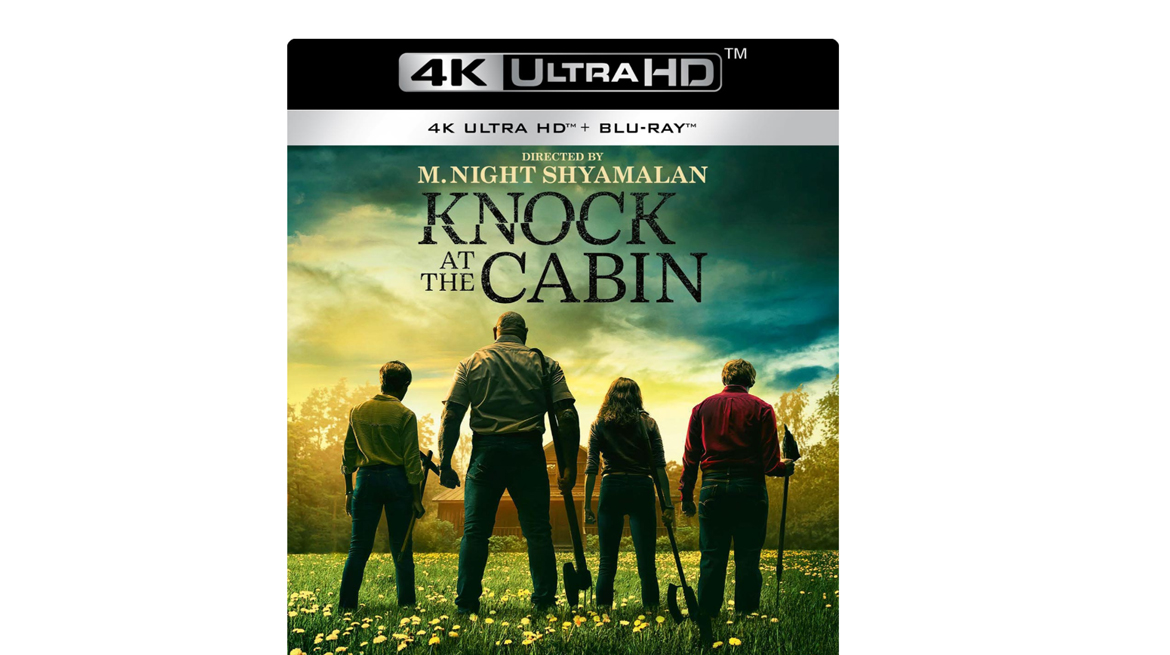TL;DR
M. Night Shyamalan's "Knock at the Cabin" features a family's peaceful vacation shattered by strangers with a world-saving, apocalyptic choice. While Dave Bautista and young Kristen Cui deliver standout performances, the film's initial tension and Shyamalan's signature twist can't quite salvage a narrative that loses steam and resorts to tropes in its latter half. The UHD version boasts stunning visuals and immersive sound, but the lack of bonus features on some releases is a letdown. Discover if the sacrifices made in this adaptation are worth the journey. Read the full review to find out!
In Knock at the Cabin, we are introduced to Eric (Jonathan Groff), Andrew (Ben Aldridge), and their daughter Wen (Kristen Cui), who are vacationing in a remote cabin in the United States. Their tranquility is disrupted by the arrival of four enigmatic strangers, led by Leonard (Dave Bautista). The strangers forcibly enter the cabin, holding the family hostage. As events unfold, the family begins to understand the strangers’ purpose, discovering that not only are their lives at risk, but potentially the fate of the world hangs in the balance.
M. Knight Shyamalan garnered significant attention with The Sixth Sense, released in 1999. The film’s twist ending became a widely discussed element of his work, establishing an expectation that every subsequent film would feature a notable plot twist. This holds true in Knock at the Cabin. While the central twist was foreseeable, the film remains a well-executed production until its conclusion.
Dave Bautista (Guardians of the Galaxy, Blade Runner 2049) continues to demonstrate his ability to portray serious and compelling characters, holding his own alongside more traditionally trained actors. His performance as Leonard is particularly noteworthy, offering him a rare opportunity to delve into a complex character. However, Kristen Cui, at just 10 years old, delivers a standout performance in Knock at the Cabin. She shoulders a significant portion of the film’s emotional weight with remarkable skill, evoking comparisons to memorable performances in films like Aliens. Rupert Grint (Ron from the Harry Potter series) is somewhat underutilized, though he effectively showcases a different facet of his acting abilities, which is a welcome change.
The initial portion of Knock at the Cabin is arguably its strongest. As the motivations of the four visitors become increasingly clear, the film’s momentum diminishes, and it unfortunately resorts to familiar tropes.
Knock at the Cabin is adapted from The Cabin at the End of the World by Paul G. Tremblay (a title that arguably reveals too much of the narrative). M. Knight Shyamalan made judicious choices in altering certain aspects of the story for the film adaptation. The source material exhibits a darker tone, but not necessarily to its benefit.
The UHD edition of Knock at the Cabin boasts exceptional visual fidelity, owing to its direct transfer from the 35mm film source to 4K. The release supports both Dolby Vision and HDR-10 (as a primary or fallback option). The contrast between the vibrant forest scenery and the dimly lit interior of the cabin is presented with impressive clarity. The image is free of compression artifacts and maintains stability, even during rapid camera movements.
The Dolby Atmos sound design is surprisingly robust for a film that is relatively light on action sequences. The sound is most effective during the initial scenes depicting the strangers’ attempts to enter the cabin. The audio system creates an immersive experience, effectively conveying the characters’ sense of terror through sound placement and movement. Herdís Stefánsdóttir’s score is well-integrated throughout the film, and the overall sound balance is expertly calibrated, eliminating the need for manual adjustments.
Universal continues its practice of omitting bonus features from its releases in Sweden. Consequently, Knock at the Cabin lacks extras. International editions include five behind-the-scenes documentaries and deleted scenes, indicating that supplemental material exists. The decision to exclude these features from the Swedish release is regrettable.
In conclusion, Knock at the Cabin falls short of a full recommendation, partially due to the omission of extras in the UHD edition, but primarily because the film’s quality diminishes in its latter half (a recurring issue in some of Shyamalan’s previous works). This is disappointing, as the first half showcases some of M. Night Shyamalan’s strongest work in recent years.
SF Studios provided the review copy for this evaluation. Providers of review materials have no editorial influence on our assessments. Our reviews are conducted independently, with the interests of our readers and consumers as our foremost concern.
